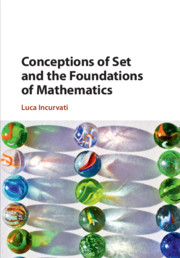Book contents
1 - Concepts and Conceptions
Published online by Cambridge University Press: 09 January 2020
Summary
The chapter explains what conceptions of set are, what they do and what they are for. Following a tradition going back to Frege, concepts are taken to be equipped with criteria of application and, in some cases, criteria of identity. It is pointed out that a concept need not settle all questions concerning which objects it applies to and under what conditions those objects are identical. This observation is used to characterize conceptions: a conception settles more questions of this kind than the corresponding concept. On this account, a conception sharpens the corresponding concept. This view is contrasted with two other possible views on what conceptions do: one according to which they provide an analysis of what belongs to a concept, and one according to which they are possible replacements for a given concept. The chapter concludes with a discussion of the uses of conceptions of set. Along the way, the naïve conception of set, which holds that every condition determines a set, is introduced and a diagnosis of the set-theoretic paradoxes is offered. According to this diagnosis, the naïve conception leads to paradox because it requires the concept of set to be both indefinitely extensible and universal.
Keywords
Information
- Type
- Chapter
- Information
- Publisher: Cambridge University PressPrint publication year: 2020
